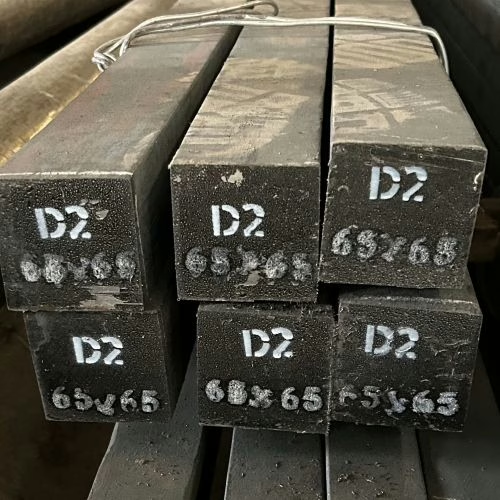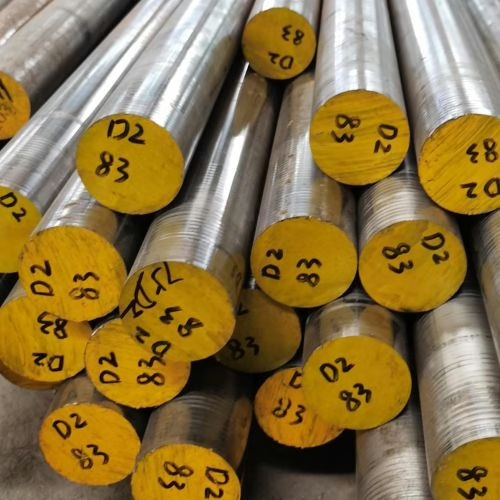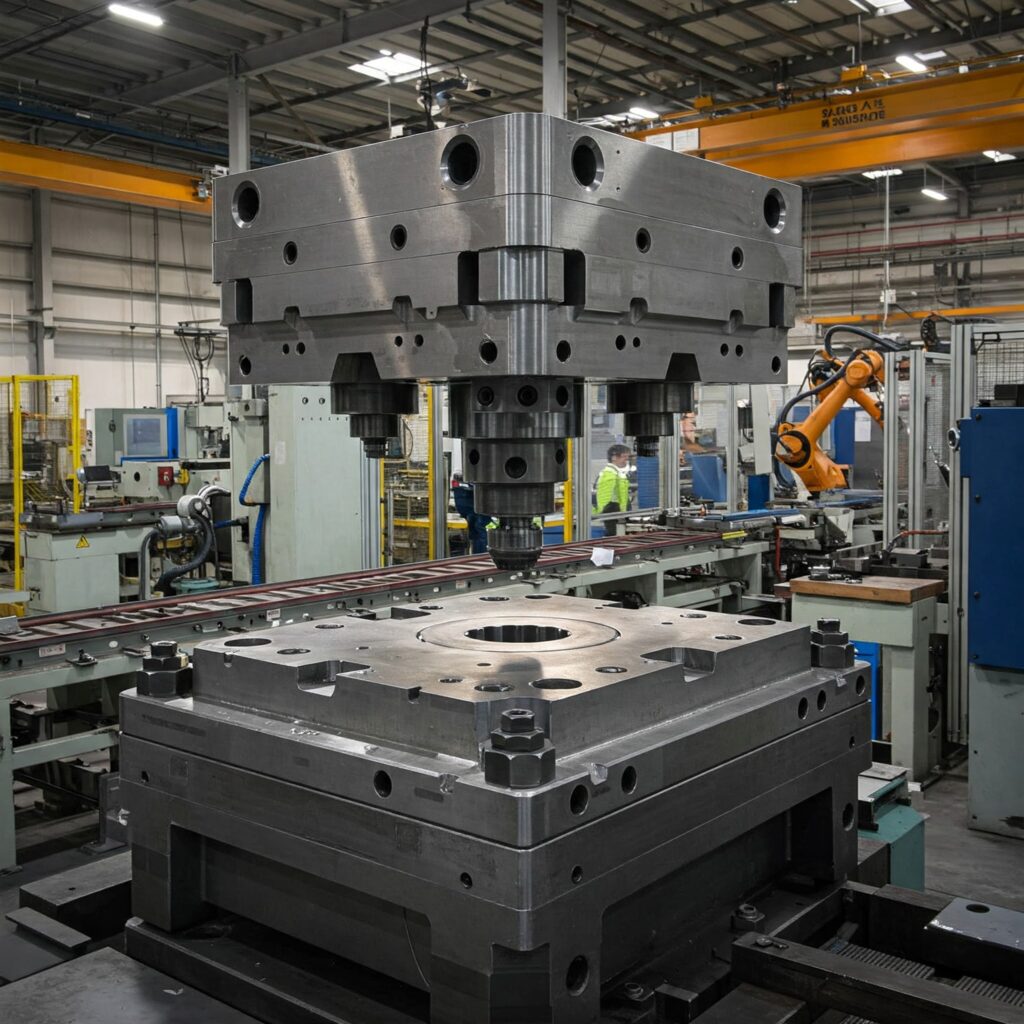This article provides a comprehensive analysis of D2 steel‘s properties, examining its chemical composition and revealing the metallurgical principles that determine its performance. For decades, it has served as a benchmark for performance, a workhorse material prized for its remarkable ability to resist wear and hold a sharp edge through demanding tasks. D2 tool steel belongs to the D group classification of cold-work tool steels, an alloy family characterized by high carbon and chromium content.
The composition of D2 steel and its effects on the properties
| Element | Content (Weight%) | Role in D2 Steel Properties |
| Carbon (C) | 1.40 – 1.60% | Forms hard carbides for wear resistance, increases hardness |
| Chromium (Cr) | 11.00 – 13.00% | Deoxidizer improves hardenability and tensile strength |
| Molybdenum (Mo) | 0.70 – 1.20% | Primary element for carbide formation, wear resistance, hardenability, and some corrosion resistance |
| Vanadium (V) | 0.50 – 1.10% | Improves hardenability, toughness, and secondary hardening |
| Manganese (Mn) | 0.10 – 0.60% | Deoxidizer, which can improve hardenability and tensile strength |
| Silicon (Si) | 0.10 – 0.60% | Deoxidizer, strengthens ferrite |
D2 Steel Properties
The interplay between D2’s chemical composition, microstructure, and heat treatment results in a distinct set of performance properties. This section provides a detailed, data-backed analysis of each key characteristic.
Wear Resistance and Edge Retention
Its superior wear resistance comes from its high content of carbon and chromium, which form a large volume fraction of hard, chromium-rich alloy carbides (M7C3) within a tempered martensitic matrix. These carbides, along with molybdenum and vanadium, significantly improve both abrasive and adhesive wear resistance.
Regarding edge retention, D2 steel offers good toughness, particularly when compared to higher-carbon D-type steels such as D3 and D7. There is an inherent trade-off: increasing hardness for wear resistance generally decreases toughness, and vice versa. While D2 possesses excellent wear resistance, it is considered moderately tough and somewhat brittle. For applications requiring maximum wear resistance, D2 is often used as an insert in a tougher casing, such as H11 steel. Nitriding or PVD titanium nitride coatings can further enhance the wear resistance of D2 steel without compromising its dimensional stability.
Hardness and Toughness
D2 steel’s elements combine to form a large volume fraction of hard, chromium-rich alloy carbides, primarily of the M7C3 type, within a tempered martensitic matrix. These carbides are significantly harder than cementite, contributing to superior abrasive and adhesive wear resistance. D2 steel typically achieves a Rockwell C (HRC) hardness of 58–60 for normal working applications, and up to 60–62 HRC for specific uses, such as coining small aluminum parts. After ion nitriding, its surface hardness can reach 750–1200 HV. The typical heat treatment involves austenitizing at around 1010 °C (1850 °F), followed by air quenching and double tempering at higher temperatures, such as 515 °C (960 °F) and 480 °C (900 °F), which can yield a hardness of 58 HRC while enhancing wear resistance due to grain refinement. Learn more about D2 steel hardness, please refer to D2 Steel Hardness – Unlocking Superior Wear Resistance.
For toughness, D2 steel is considered to have moderate toughness, but it is somewhat brittle, often exhibiting low impact strength. This is an inherent trade-off, as increasing hardness to improve wear resistance typically results in a decrease in toughness. The low toughness of high-carbon, high-chromium cold-work tool steels, such as D2, stems from the high-carbon martensite and the presence of coarse, undissolved carbides, which can act as fracture initiation sites. While tempering can increase the toughness and plasticity of martensite by reducing residual stresses, the transformation of retained austenite during tempering can also introduce additional carbides, potentially increasing the sensitivity to fracture. Toughness minima are observed after tempering at around 480 °C (900 °F) due to the transformation of retained austenite. D2 generally offers better toughness compared to higher-carbon D-type steels such as D3 and D7. For applications demanding higher toughness, a different grade of steel with inherently superior toughness is often recommended, rather than trying to push D2 beyond its design limits.
Machinability and Grindability
D2 steel presents significant machining challenges, typically having a low machinability rating. For instance, when properly annealed, D2 achieves a machinability rating of 45, compared to 100 for 1% carbon steel. Alternatively, the machinability of D2 steel is 60% that of annealed W1 tool steel, or 30-40% that of free-cutting steel B1112. Despite being difficult to machine, D2 is a suitable steel for long-run stamping applications. Machining hardened D2 steel typically involves cutting speeds ranging from 80 to 220 m/min and feed rates from 0.05 to 0.15 mm/rev, with a constant depth of cut of 0.2 mm, when turning for surface finish.
For grindability, D2 steel is also described as difficult to grind due to its high chromium content, combined with its higher carbon content. Grindability, or the ease with which excess stock can be removed using standard grinding wheels, is measured by the grinding ratio (volume of metal removed per volume of wheel wear). This ratio generally decreases as alloy and carbon contents increase. The presence of coarse, undissolved carbides, such as the M7C3 type found in D-grade steels like D2, significantly affects abrasive wear resistance and grindability. Finer carbide sizes, often achieved through powder metallurgy processing, can lead to improved grindability.
Corrosion Resistance
D2 steel, despite its high chromium content, is generally not considered to have the corrosion resistance characteristic of stainless steel. This is because much of its chromium is incorporated into alloy carbides, rather than being available to form a continuous, protective passive film. While D2 steels do exhibit excellent oxidation resistance at high temperatures and provide appreciable resistance to staining after tools are hardened and polished, their overall resistance to general corrosion is limited. Nitriding processes, which achieve high case hardness in D2 steel, do not render it completely corrosion-resistant, and further chromium additions would be necessary to enhance this property.
Dimensional Stability
D2 tool steel is recognized for its relatively high dimensional stability during heat treatment compared to other tool steels. Upon air quenching from the appropriate hardening temperature, D2 typically exhibits an expansion or contraction of approximately 0.0005 inches per inch. (0.0005 mm/mm). However, factors such as part geometry and other distortions, such as bending or twisting, can introduce variations. Its high carbon and chromium content aid in minimizing microstructure distortion during metal formation and fabrication. The key factor affecting the dimensional stability of D2 steel is retained austenite, which can reach up to 20% after standard heat treatment. This retained austenite may spontaneously transform into unquenched martensite at room temperature, leading to subsequent dimensional changes. Implementing specific heat treatment cycles—such as quenching after holding at 345°C (650°F) for one hour—enhances dimensional stability at room temperature. Part design also profoundly influences deformation levels by affecting the uniformity of heat transfer.
Mechanical and Physical Properties of D2 Steel
| Property | Metric Value | Imperial Value |
| Density | 7.70−7.75g/cm3 | 0.278−0.280lb/in3 |
| Melting Point | 1421℃ | 2590℉ |
| Modulus of Elasticity | 190−210GPa | 27,557−30,457ksi |
| Poisson’s Ratio | 0.27−0.30 | 0.27−0.30 |
| Thermal Conductivity | 20.0−25.0W/m⋅K | 11.58−14.5BTU⋅in/h⋅ft2⋅℉ |
| Specific Heat Capacity | 460J/kg⋅K | 0.11BTU/lb⋅℉ |
| Coefficient of Thermal Expansion (20−100∘C) | 10.4×10−6/℃ | 6.4×10−6/℉ |
| Tensile Strength (Hardened) | ≈1800MPa | ≈261,000psi |
| Yield Strength (Hardened) | ≈1500MPa | ≈217,500psi |
| Hardness (Hardened, Rockwell C) | 55−62HRC | 55−62HRC |
| Hardness (Annealed, Brinell) | 220−255HBW | 220−255HBW |


The Effect of Heat Treatment on the Properties of D2 Steel
The mechanical properties of D2 steel are profoundly influenced by its heat treatment, which typically involves austenitizing, quenching, and tempering.
- Austenitizing determines the degree of carbide dissolution, the uniformity of the austenite structure, and the grain size, thereby influencing the hardenability and ultimate properties of the steel. Higher austenitizing temperatures lead to greater dissolution of carbides, increasing carbon and chromium in solid solution, which can lower the Ms (martensite start) and Mf (martensite finish) temperatures and increase the amount of retained austenite. Overheating or over-soaking during austenitizing can damage the molecular structure and lead to brittleness, while under-cooking results in a lack of hardness. D2 steel is expected to achieve a hardness of 64 HRC after quenching.
- After austenitizing, D2 steel is typically air-quenched, though oil quenching can also be used. Air quenching minimizes distortion. The cooling rate during quenching facilitates the transformation of austenite into martensite, which is the hardest constituent in low-alloy steels and a primary goal for achieving satisfactory hardness.
- Tempering is a critical post-quenching heat treatment for D2 steel, typically performed at temperatures ranging from 480°C to 540°C (900°F to 1000°F). It is performed as soon as possible after cooling to reduce residual stresses and prevent cracking. D2 steel often requires multiple tempering cycles (e.g., double or triple temper). Multiple tempering treatments refine the grain structure, improve wear resistance, and provide stress relief. Significantly, tempering reduces the amount of retained austenite, which can be as high as 20% after standard heat treatment, thereby improving dimensional stability and preventing spontaneous transformation to untempered martensite at room temperature over time. This process involves the transformation of metastable epsilon-carbide to cementite and the precipitation of alloy carbides, resulting in an increase in hardness and volume, known as secondary hardening.
For specific methods of heat treatment for D2 steel, please refer to How to Properly Heat Treat D2 Steel.
Applications
Based on these properties, D2 is a go-to material for tough cold work jobs needing high wear resistance:
- Dies: Blanking, forming, stamping, drawing, thread-rolling, extrusion, and trimming dies. Especially good for long production runs.
- Punches: Piercing punches, cold forming punches.
- Blades and Knives: Shear blades, slitter blades, industrial knives (for paper, wood).
- Rolls: Forming rolls, seaming rolls, drive rolls.
- Wear Parts: Gauges, mandrels, lathe centers, and occasionally guides or cams, where high wear resistance is required.
Conclusion
D2 steel’s high-carbon, high-chromium chemical composition and its unique carbide-rich microstructure ensure it remains a reliable choice in industrial workshops and among tool users. It offers high wear resistance, high hardness, and cost-effectiveness. However, its drawbacks are equally evident: its toughness is not particularly high, making it unsuitable for high-impact applications, and it presents significant machining challenges. Regardless, D2 steel’s value proposition remains as solid today as it was decades ago.


